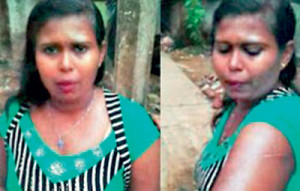The plight of a sex worker in Ratnapura, who was assaulted by a cop in public and now has her mother remanded over trumped up charges of prostitution is microscopic of the evils that beset Sri Lankan society.When the victim complained, the police refused to press charges against their ilk and tried to bribe the woman to withdraw her complaint. Failing that, they orchestrated a demonstration by the local three-wheeler wallahs against the aggrieved woman and proceeded to arrest her 65-year-old- mother, who was later remanded.
This is a case where multiple perils in the everyday Sri Lankan life have shown up simultaneously. There are the roguish police who act with impunity. There are sycophant lower courts which serve as a protector of the status quo and fail to provide legal protection to vulnerable members of society. There are local hoodlums, compliant villagers and a residue of feudalism.
“Sri Lanka at its independence was free, by the then world standards. They reflected the standards the colonial Britain. However, freedoms of that era represent only a fraction of contemporary notion of the civil liberties. They were the best at that time, yet they were vastly imperfect, including in the mother of all democracies.”
In short, this is a case which highlights how sordid, brutal and harsh life is, especially for average folks in an increasingly stratified Sri Lankan society.
The absence of institutional guarantees for the protection of marginalized segments fosters impunity. It is a vicious cycle and its toll on our lives is well documented.
However, one important attribute is missing in this particular discourse. That is our insular culture which feeds into this general decay. This particular retrograde attitude towards a wider range of social freedoms has impeded modernity, fostered subservience and under-achievement.
The contemporary Middle-Eastern history has proved that rigid and regressive social structures are resistant to modernity and individual rights.
The Sri Lankan case is not as dire as that of the Middle East, which suffers from a fatal mix of highly descriptive religion, rigid social structures of a Nomadic society and prolonged absence of any form of meaningful democratic exercise, something that a majority of British colonies were exposed to, beginning in the 19th century.
Nevertheless, Sri Lanka has a problem in terms of increasingly obsolete social mores which inhibits individualism, civil liberties and personal freedoms including sexual autonomy.
That should not be the case as the chroniclers of the ancient Sinhala kingdom, such as Robert Knox described natives as being freewheeling and native women as being liberating and confident. The libertarian hospitability of the Sinhalese (whom he called Chingulayas) went to the extremes that they did “treat their friends with the use of their wives and daughters.” (That is going a bit too far in terms of even the best of trademark Sri Lankan hospitality, though)
“The fact of the matter is that the wellbeing of the women touted as the justification for the law is only a facet for creeping morality which is at its heart. But that does not stop women from engaging in prostitution and men soliciting them. Morality does not make ends meet, but prostitution does.”
Somewhere in the line, the evolution of Sri Lankan social mores got stuck. When or why it happened is a topic worth exploration by a sociologist.
However, here is my reading on the issue. To begin with, I do not subscribe to the popular buffoonery that the Sinhalese kingdom that fell to the British hands in 1815 was one that was enlightened, peaceful and had structures that were better than what emerged under the colonial rule. Months before the collapse of the Kandyan Kingdom, the tyrannical last king had executed the entire family of his former courtier, Ehelepola Adikaram, who fell out of favour of the monarch. (The youngest of Ehelepola’s offspring was placed in a ‘vangadiya’ and pounced; men and male children in the family were beheaded and women were drowned in the Kandy Lake.) In modern times, those are crimes that warrant a liberal intervention. Nevertheless, British motives in Sri Lanka were not altruistic, and were primarily mercantile.
However, during the latter half of its rule, the British Empire, the first liberal hegemony to rule the world, embarked on a truly civilising exercise and unleashed greater goodness, ranging from economic and social infrastructure to democratic institutions, that shaped the destinies of its colonies. The subsequent failure of those countries to capitalize on those advantages after their independence was a case of the collective failure in the nation-building exercise. Countries with immense potential such as Nigeria descended into corruption and nepotism under both elected leaders and military dictatorships, while others like India, which retained its democratic traditions, failed to economically uplift its teeming masses due to misplaced ideological bias to a statist and planned economy.
However, from the early days, the colonial British revamped the traditional and feudal societies in the Orient. Caste based discrimination was abolished. (The continuance of the ancient caste system, which ensured the privileges of local nobility was one of the guarantees that the Sinhalese aristocracy obtained from the British under the 1815 Convention, which ceded the Kandyan Kingdom to the British.)
Sex workers and allies demonstrate against abuse by “Anti-Social Behavior Order” (ASBO), Stratford Magistrates’ Court, London, July, 2013
Sri Lanka obtained universal suffrage in 1931 under the Donoughmore Commission and free education was guaranteed in 1944, while the country was still a British Colony. What is most important, however, was that from the mid-19th century up until their departure, British set in motion a process of liberal constitutionalism, which enhanced individual rights, ensured equal treatment before the law and underpinned trade and commerce.
“There are the roguish police who act with impunity. There are sycophant lower courts which serve as a protector of the status quo and fail to provide legal protection to vulnerable members of society.”
Those values were equally important for that an electoral democracy cannot function successfully in their absence. In the evolution of democracy, those values have preceded voting rights in all the liberal democracies.
In 1948, we received independence and during the ensuing years, the modernist exercise came to a halt, as the local political elites sought to revive indigenous cultures. Flawed nation-building policies such as Swabasha education also had their toll.

Sri Lanka at its independence was free, by the then world standards. They reflected the standards the colonial Britain. However, freedoms of that era represent only a fraction of contemporary notion of the civil liberties. They were the best at that time, yet they were vastly imperfect, including in the mother of all democracies. For instance,in the fifties, in Britain, homosexuality was punished with chemical castration. One such victim was the legendary World War II code-breaker, Alan Turing, who later committed suicide. (It took another 60 years for his conviction to be overturned by a royal pardon.)
However, while Sri Lanka and much of the newly independent world were locked in the confines of Victorian values, another great revolution swept through Europe and America in the sixties. It is called sexual revolution. It challenged the puritanical Victorian values of the day and radically transformed the way sexuality was perceived. It enhanced sexual freedoms and propelled a quest for sexual autonomy. It radically transformed mainstream attitudes towards sex and by extension, enlarged the confines of civil liberties to the levels which were unimaginable a decade before.
Sri Lanka, like its neighbours missed that revolution. We were busy cheering for the exploits of Mao Zedong and Che Guevara, whose designs were meant to erase individual identity in favour of collectivism. That turned out to be a journey to nowhere, at best and to eternal servitude and subservience, at worst, as we learnt in the latter decades of the 20th century.
In the meantime, the other revolution that swept through the western world liberated millions. The gay liberation movement sprung from the riots of Stonewall, New York, in the late sixties. Forty years on, much of the Western world has legalised same sex unions, and even better, same sex marriages. Activism by a motley group of men, women, transgender, feminists, hippies, radicals and students dramatically enhanced the confines of civil liberties. The world is freer today than it was neverbefore.
The developing world missed that social movement due to economic, cultural and demographic reasons. Low income levels, cultural baggage, and slow urbanization were factors that impeded the quest for greater liberties. Those factors are continuing to foster the disparity between the individual freedoms in the West and the East.
Sri Lanka, in fact, had the world’s first female prime minister, a female executive president and many ministers of the fair sex. However, they were all supporters of the status quo and had little impact on promoting greater freedoms. Sri Lanka also had an openly gay foreign minister, a prime minister and a cohort of ministers, yet, even those intrinsically liberal political elites did not have the political will to decriminalize, let alone to legalize homosexuality.
That was largely due to the regressive local culture, which did not provide an ideological underpinning for such an endeavour. By extension, it forces people to live a lie.
And the very failure to institute liberal reforms continues to victimize the most vulnerable and marginalized segments of our society. The case of ‘Batti’, the woman in Ratnapura is one among countless such incidents, majority of which go unnoticed and undocumented.
It also reveals the hollowness of the moral card. The law against prostitution is one that is often abused by the cops themselves and other the clients. The law that is meant to protect women from being exploited, in reality, makes life harder for them. The fact of the matter is that the wellbeing of the women touted as the justification for the law is only a facet for creeping morality which is at its heart. But that does not stop women from engaging in prostitution and men soliciting them. Morality does not make ends meet, but prostitution does. And when conducted within safe confines,regulated and sex workers provided with necessary safeguards against exploitation and trafficking, prostitution is no different from any other commercial service. Whereas the existing law on prostitution victimizes thousands of vulnerable women, whom the law is meant to protect. It is this dichotomy between expectations and reality that the lawmakers of this country — and many other developing countries — have failed to understand.
In the final analysis, in any civilized society, an adult man or a woman –and not the State — is the sole guardian of his or her personal wellbeing. Neither morality, nor culture provides a convincing justification to deprive an adult human of the full scope of individual rights. Sri Lanka has to go there. And, until, we get there, we are not civilised enough.
Ranga Jayasuriya can be reached at [email protected] and @RangaJayasuriya on Twitter
– Ceylon Today
